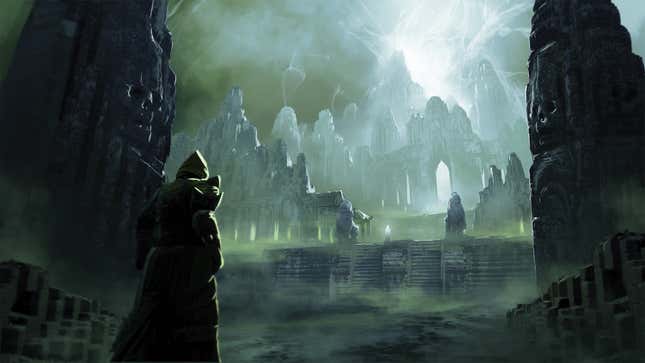
Role-playing games are one of my favorite genres. They’re also the genre I came latest to. I didn’t play video games for most of my teenage years, the time when I would have lost entire weekends and nights to them. Coming to love them as an adult has been a minor tragedy, because the amount of time I have to dedicate to 60-hour epics is shrinking dramatically with each passing year, and I am not quite ready to admit that I cannot play them all.
So I look for that sprawling feeling elsewhere when I can—books, mostly, since the time I spend in front of screens is probably best described as “unconscionable.” Strangely, I don’t really gravitate toward fantasy literature, since I’m not particularly interested in swords and magic and courtly intrigue. I specifically want the feeling of role-playing games: I want to be so transported I feel outside of myself, watching the beautiful little struggles of people who are ultimately small cogs in something incomprehensibly big.
Recently, I finished reading award-winning novelist Marlon James’ latest work, Black Leopard, Red Wolf, precisely because that’s what it offered. In a recent profile, James—who previously made his name in literary fiction with novels like A Brief History of Seven Killings—declared his intent to “geek the fuck out” with an “African Game of Thrones,” to give the kinds of people and folklore that rarely get centered in Western fantasy their due. It rules—partly because it feels a hell of a lot like playing through a Baldur’s Gate game.
The novel is about a man known only as Tracker, who recounts his personal history to a mysterious inquisitor who ultimately wants to know what happened when Tracker accepted a job to find a missing boy, a job that ultimately leads to something horrifying.
Black Leopard, Red Wolf is a dense, difficult book that slips in and out of focus from one passage to the next. It’s a tall, thick volume at 620 pages long—to read it for long stretches is to fall into a trance where you’re aware of the shape of things, even if you can’t always make out the details. It’s reassuring to have some kind of horizon to look toward, a wall to lean against when I felt disoriented.
That’s why I say it feels like a good role-playing game: The story starts with Tracker coming of age in the villages of the Riverlands and follows him until he comes to a city and joins a party. They venture out and face monstrous horrors on the road, and then, at another city, they find answers. Along the way, we meet characters who tell their stories at length and have their own agendas and side quests, some of which seem like they’re detracting from the main plot but ultimately end up being diversions you’re glad you took. (The story of Sad Ogo—a massive man you should not call a giant—is devastating.)
This isn’t something we haven’t seen in fantasy literature—it’s good narrative structure. You can recognize this in all sorts of stories across media. It’s just cool to see video games fall so neatly in this tradition, another voice in one big story that we’re all telling. It’s becoming more explicit, like the way the current generation of fantasy authors are openly influenced by Japanese role-playing games. (If you want something that will rock your goddamn world, put Ken Liu’s The Grace of Kings next to Suikoden II.)
Reading Black Leopard, Red Wolf, I felt small. Maybe it’s weird to say this, but that’s one of my favorite feelings in video games—I like big sprawling games that suggest a wealth of stories unfolding around me, with nothing but my time and attention keeping me from finding them. And man, how I wish I had more time.